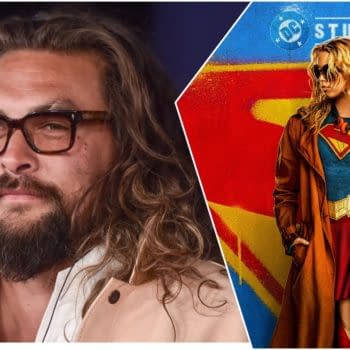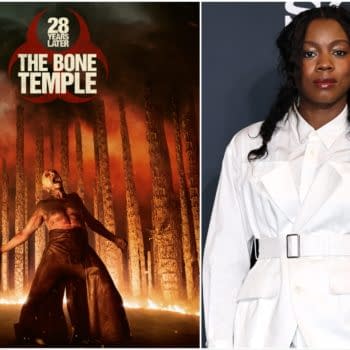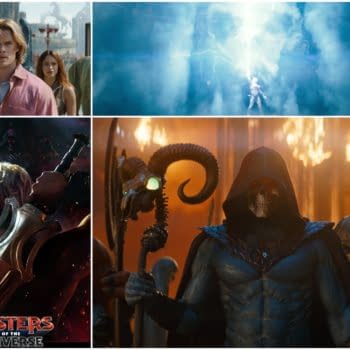Posted in: Movies, Recent Updates | Tagged: alison pill, bong joon ho, chris evans, Comics, ed harris, entertainment, film, harvey weinstein, John Hurt, Le Transperceneige, snowpiercer, Song Kang-Ho, tilda swinton
Snowpiercer: All Aboard The Class Struggle Express! – Look! It Moves! By Adi Tantimedh
Adi Tantimedh writes:
Snowpiercer, Korean director Bong Joon-Ho's science fiction thriller, is as good as people say it is. Here's a dystopian Science Fiction thriller that's as fun as it is dark. It's the most fun you're going to have watching Class Warfare and humanity at its worse after the world has already ended.
Adapted from the 80s French graphic novel Le Transperceneige, the movie takes place in a future where an attempt to stop Global Warming with an experimental chemical has resulted in the world freezing over and the last surviving humans having taken refuge on a speeding train that circles the globe. The rich and privileged enjoy a life of comfort and luxury at the front of the train while the poor scrape along under martial law at the back. One man decides to lead the latest in a series of attempted revolts in the train's decade-long history, and his might just succeed.
Now, you can't be blamed if you think this premise sounds a bit silly, but the movie runs with it for all it's worth. It's perhaps more Kafka and Brecht than hard Science Fiction, but there's a refreshing conviction in the way it pursues its metaphors and symbols of the haves and have-nots, of class exploitation and revolt. The train is The World, and its passengers are locked in a cycle of oppression and dissent violently put down by guards and brutal punishment. It might be a dour, tragic world, but the way the story is told is far from grim. If anything, it's surprisingly happy marriage of French satire and Korean misanthropic dark comedy. It's not subtle, it's stylised and hyperreal as a comic book.
The characters are purposely written as types, but the movie is filled with eccentric quirks and agit-prop levels of polemical speeches. You can't accuse the cast of indifference or phoning in their performances. Chris Evans is brooding and anguished as the reluctant rebel leader, Tilda Swinton petty and craven, yet pathetic as a political party hack possibly inspired by Margaret Thatcher, but without the elocution lessons and the media training, John Hurt is weary and furtive as the wise elder nearing the end of his time, Alison Pill as a disturbingly chirpy schoolteacher reciting state propaganda with her students, Ed Harris as the insane dictator arguing a brutal pragmatism, Song Kang-Ho as the cynical rogue engineer with an agenda entirely his own. This is slapstick comedy where blood splatters and people die.
The movie is filled with light and darkness, changing colours and rhythms as the characters move from one train car to the next, from the drab, grey rear cars to the increasingly trippy, hallucinatory decadence of the luxury cars in front. The confrontations and setpieces with the guards and agents of state oppression are surreal and brutal, an escalation from sticks to blades to axes to bullets and eventually explosives. The vision of the movie is that of one director with a very particular point of view and sense of humour. This is a movie punctuated by grace notes and eccentric moments: the pause in violence as the combatants stop to wish everyone a happy new year, an interlude where the rebels stop to eat sushi and experience sunlight for the first time in their lives, the men in black hoods ritualistically gutting a fish as a gesture of intimidation, Tilda Swinton's false teeth and exasperated Northern accent.
In the end, Evans' character and we are confronted with an uncomfortable political reality: that dictatorship and revolt are flipsides, a dance that needs both partners, and everyone that lives under the system, whether supporters or dissenters, are ultimately complicit in its upkeep. Rebellion might be a façade to con the public into believing that change is possible when it's only going to be the same old shit all over again, because the same old shit might be the only choice left in a doomed world. The alternative is death for everyone. Or is it? Maybe it's time to think outside the box and blow up the whole rotten world to see if there's anything left outside.
That's a harsh and uncomfortable political message that no Hollywood studio would dare tackle now. I wonder if that was what Harvey Weinstein felt the need to try to cut in order to sell this movie to his idea of the idiot American moviegoer. His desire to cut at least 20 minutes out of Bong's original cut would have gutted the movie because every line, every action, every setpiece was an expression of the central political polemic. That Bong won his war of attrition with Weinstein and managed to get his director's cut released in the US is the result of some savvy political manoeuvring, even if Weinstein's retort is to release the movie without any marketing or PR, no billboards, posters or TV spots. Where the movie is already a hit all over Asia and in France, it's going to have a cult following in the US at best.
Of all the Korean directors earning an international reputation, Bong Joon-Ho has always been the most political, but at the same time, he possesses an entertainer's instincts and visual flair. His first movie, Barking Dogs Never Bite, was a social satire dissecting the malaise and pressures of Korean middle-class life as a hen-pecked, frustrated, academic bonds with a misfit, fantasist, college girl over the annoying, yapping neighbourhood dog that's gone missing. His second movie, Memories of Murder, partially inspired by Alan Moore and Eddie Campbell's From Hell, is an indictment of the brutality and complacency of the martial law years as an inept rural police department fails to catch the country's first documented serial killer. His monster movie The Host tackles environmental issues and pollution. Mother uses the murder mystery to deal with the unfairness of downtrodden working-class life and the ruthless tenacity of the mother in Korean society. Now Snowpiercer adds Science Fiction to the list where Bong uses a commercial, even pulp, genre to explore political and social ideas. His point of view and dark sense of humour have been consistent and unwavering over five movies, all of which are available on DVD in the US now.
It's an interesting coincidence that Snowpiercer opens in the US in the same weekend as Radio Free Albemuth, another political science fiction movie about the need to fight tyranny and the price to be paid for doing so. The two movies actually make a terrific double feature.
Snowpiercer opened in New York and Los Angeles last weekend and expands to 50 cities across the US this Friday.
Waiting for my train at lookitmoves@gmail.com
Follow the official LOOK! IT MOVES! twitter feed at http://twitter.com/lookitmoves for thoughts and snark on media and pop culture, stuff for future columns and stuff I may never spend a whole column writing about.
Look! It Moves! © Adisakdi Tantimedh


















